Rule 41, Broken: Why I Had to Sue Lorain City Council to Get Sunshine Law Compliance
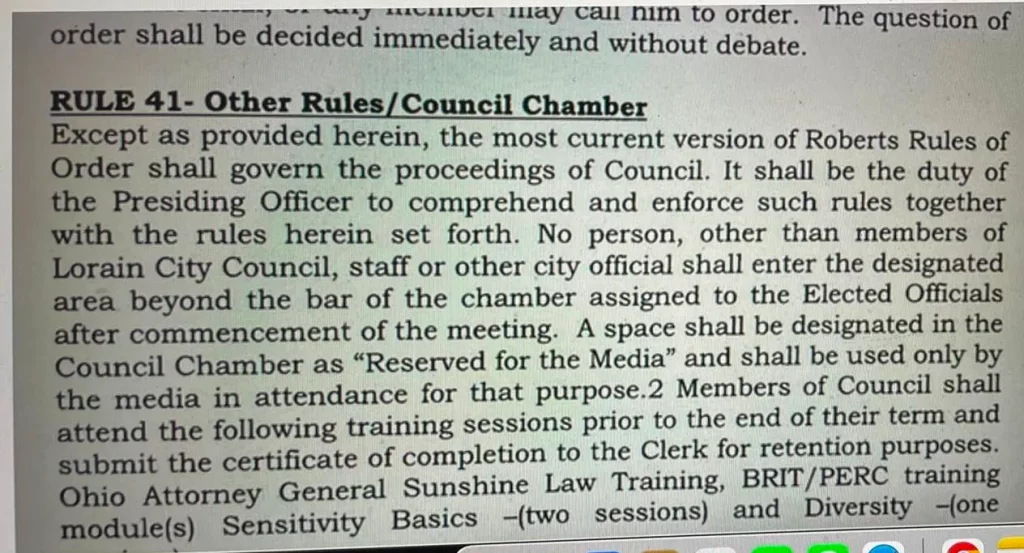
Five of Eleven Lorain Council Members Attended Mandatory Ethics Training—But the Clerk Still Won’t Hand Over Their Certificates
May 22, 2025
By Aaron Christopher Knapp, Lorain Politics Unplugged
I. Introduction – The Law Is Clear, But Lorain Isn’t
In the State of Ohio, public officials are required to undergo Sunshine Law and ethics training, a mandate designed to ensure transparency and accountability in government. The City of Lorain reinforces this state-level obligation through Council Rule 41, which specifically requires each council member to submit a certificate of completion to the Clerk of Council. This rule is not discretionary. It is binding.
Thanks for reading Aaron’s Substack! Subscribe for free to receive new posts and support my work.
Despite the clarity of this obligation, the Clerk of Lorain City Council, Breanna Dull, failed to provide these certificates upon request. The city responded with an attendance spreadsheet from the Ohio Attorney General’s webinar, not the actual certificates required by law. After multiple follow-up requests went ignored or inadequately addressed, I filed a formal public records complaint with the Ohio Court of Claims on May 21, 2025.
Council Rule 41 is not vague or interpretive—it is a firm expectation. By failing to submit certificates or even produce them upon demand, Council and the Clerk collectively defy both municipal and state law.
This article documents the circumstances and legal violations behind my second public records lawsuit against the City of Lorain. I use only verified documents and data, and the facts speak for themselves: most council members did not submit their training certificates. Most likely never completed the training.
Under Ohio Revised Code §149.43, failure to promptly provide public records—especially those involving official compliance with state transparency training—is a direct violation. The law was not followed. The timeline proves it. And the response from city officials was either dismissive, evasive, or absent altogether.
This is not merely an administrative issue. It is a test of accountability. Public officials should never need to be sued just to obey the rules they expect their constituents to follow.
The deeper problem here is structural: a government that treats transparency as a nuisance rather than a duty. The public records system is designed to hold officials accountable. But when city staff treat it as optional, residents are denied their right to know.
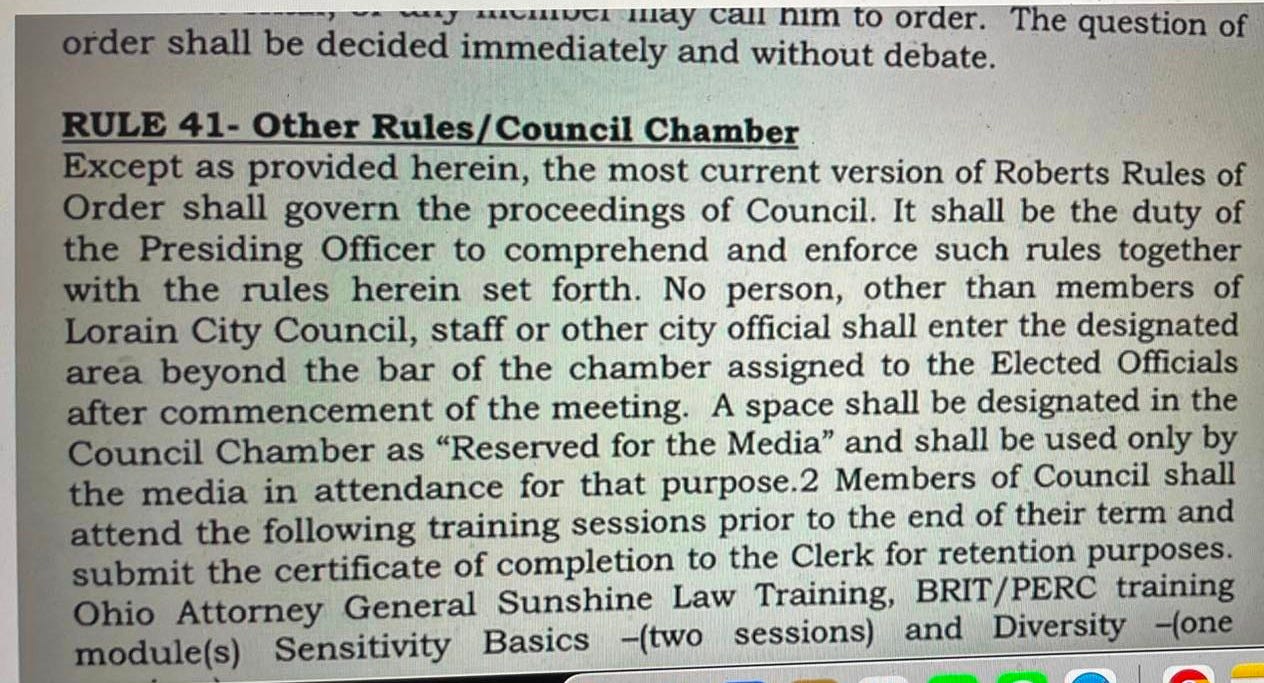
II. Rule 41 Is Not Optional
Lorain’s Council Rule 41 is explicit: all council members must complete ethics training and submit their certificates to the Clerk of Council. According to the rule:
“Each council member shall submit the certificate of completion of the Sunshine Law and ethics training to the Clerk of Council.”
The purpose is to ensure not just attendance, but completion. A certificate represents verification from the Ohio Attorney General’s office that an official has satisfied their Sunshine Law requirements. An attendance log, by contrast, only shows they clicked a link.
See ALL the Lorain Council Rules they voted on and set for themselves in 2024 that expire 12/31/2025 here: Resolution Enacting Council Rules 1/01/2024-12/31/2025
On April 14, 2025, I emailed a formal request to Clerk Breanna Dull asking for the actual certificates. I received back a multi-page spreadsheet log of names, timestamps, and Teams webinar entries. The log was dated February 7, 2024 and confirmed that only a handful of council members had logged in.
And to be a stickler to Council Rule 41 it also requires that Council have BRIT/PERC training, (2 Sessions) of Sensitivity Training, and (2 sessions) of Diversity Training. Those are requests that have yet to be made. (In Ohio, “britt/prec training” likely refers to online training for Precinct Election Officials, which prepares individuals to serve as poll workers in elections. The State of Ohio offers an online training program accessible through the Ohio Secretary of State (.gov), and it’s designed to ensure effective performance during elections. This training is typically updated and reopened closer to major elections.)
Crucially, the Clerk did not provide any actual certificates. Nor did she explain why she could not. Under R.C. 149.43(B)(3), any denial of records must be in writing and must cite legal authority. She did neither.
The spreadsheet was not enough. Certificates of completion are not optional add-ons. They are the only legally valid proof of training. This isn’t just my opinion—it’s the law, and it’s the rule passed by Council themselves.
After several more follow-ups, I gave formal three-day notice of my intent to sue. That notice, also ignored, left me no choice but to file in the Court of Claims.
A city cannot substitute informal documentation when the law requires formal certificates. Rule 41 does not leave room for alternative proof. The failure to comply is total and ongoing.
III. Who Attended and Who Didn’t
According to the Ohio Attorney General’s official attendance logs from the February 7, 2024 Sunshine Law training, only five individuals associated with the City of Lorain appear to have attended:
- Tony Dimacchia, Councilman At Large: 3h 59m 41s
- Pamela Carter, Ward 3 Council Member: 3h 19m 8s
- Mary Springowski, Councilwoman, Ward 1: 3h 21m 41s
- Maggie Partin, Deputy Clerk of Council (attended multiple sessions)
- Daniel Nutt, listed with Lorain address, but no title
That leaves six council members with no verifiable attendance or training records.
Among those not appearing: Councilmembers Angel Arroyo Jr. (Ward 6), Joshua Thornsberry (Ward 8), Beth Henley (Ward 1), JoAnne Moon (Ward 5), and Mary Spellacy (Ward 7). These individuals are all actively serving on Council, yet none of their names appeared in the Attorney General’s official training attendance log.
Councilmember Victoria Kempton has previously stated that she completed Sunshine Law training, possibly through a separate session or on her own. However, under Lorain’s Council Rule 41, it is not enough to merely attend a session—the council member must submit an official certificate of completion to the Clerk of Council. Ohio Revised Code §109.43(B) may allow for designee attendance under state rules, but Rule 41 imposes a stricter requirement: personal attendance and documentation.
This is precisely why providing actual certificates is essential. Without them, the public and press are forced to comb through raw spreadsheets and training logs to piece together who fulfilled their legal duty. Substituting attendance spreadsheets for formal documentation obstructs both public understanding and lawful enforcement of transparency rules. These individuals are all actively serving on Council, yet none of their names appeared in the Attorney General’s official training attendance log. These officials are still actively legislating. They are voting on ordinances. They are spending taxpayer dollars. Yet there is no record they completed training in transparency and ethics.
Attendance, however, is not the only issue. None of the five listed attendees have had their certificates submitted to the Clerk of Council. That’s a direct violation of Rule 41.
The city’s substitution of webinar logs for legally mandated certificates is functionally a cover-up. It is intended to satisfy surface-level compliance while avoiding actual documentation.
Even among the few who attended, no one followed through. This is a structural breakdown—not just among elected officials, but among the administrative staff charged with enforcing the rules.

IV. The Filing and the Law
After more than a month of stonewalling and refusal, I filed a public records complaint in the Ohio Court of Claims. The complaint names both Lorain City Council and Clerk Breanna Dull. It outlines the failure to produce records, the absence of legal justification, and the explicit breach of Council Rule 41.
The complaint includes a timeline showing multiple unanswered requests. Emails were sent on April 14, April 21, May 18, and May 21. Each time, the city failed to provide the certificates or even a written denial.
Under R.C. 149.43(C)(1), once notice is given and three business days elapse, a citizen may file a formal complaint. I did so on May 21. The complaint was docketed as Envelope #163221.
This is the second time I have had to sue the City of Lorain for public records access. In the previous case, the city released the documents only after litigation was filed. Even then, they refused to refund the $25 filing fee as required by R.C. 2743.75(F)(3)(b).
The complaint asks the court to order the release of all training certificates and to enforce compliance with Council Rule 41. It also asks for reimbursement of fees and a mandate to fulfill remaining requests pending with other departments.
This legal action is not political—it is procedural. I filed the complaint as a resident, not as a candidate. The city’s refusal to comply with basic records law required a legal remedy.

V. A Pattern of Noncompliance
This most recent case marks the second time I have had to file legal action against the City of Lorain just to obtain basic public records. The first occurred in September 2023, when I submitted a complaint to the Ohio Court of Claims under Envelope ID #81559. That case, Case No. 2023-00508PQ, named the City of Lorain, the Police Department, and the Safety Department as respondents. It was reviewed by Judge Lisa Sadler, with mediation facilitated by Adam Morris.
The core of that earlier complaint was the city’s refusal to produce public records related to police department operations and internal complaints. Despite multiple attempts to resolve the matter informally, the city’s departments repeatedly failed to provide any legally sufficient response. Only after the case was filed did records begin to emerge.
That litigation resulted in a partial disclosure of documents and a mediated agreement to dismiss the case. The city agreed to pay my share of the mediation costs, which confirms that they recognized the legitimacy of my request and the need to settle. However, they have still not refunded the $25 filing fee, as clearly required by R.C. 2743.75(F)(3)(b). That fee reimbursement is mandatory when a requester substantially prevails—even if the resolution occurs outside of a court ruling. The city disregarded that obligation, and to date, the refund has not been issued.
Taken together, these two cases reflect a growing problem inside Lorain government—an institutional resistance to transparency and a disregard for Ohio’s Public Records Act. It is not limited to a single department. The violations span the Clerk’s Office, Council, Safety Services, and Police.
The City’s repeated failure to comply with R.C. 149.43(B)(1)—which mandates prompt production of records—and its failure to issue written denials under R.C. 149.43(B)(3) are systemic. The delays are not about confusion or complexity; they are deliberate acts of noncompliance.
In both cases, I was forced to take on the financial and administrative burden of litigation to secure documents that should have been readily available. These are not radical requests—they are the public’s right.
If a private citizen must file two separate lawsuits in under a year to access training certificates, policy records, or digital logs, it is not the citizen who is unreasonable. It is the system that is broken. The City’s refusal to proactively comply with the law is a civic failure.
These lawsuits were avoidable. Both were preceded by clear written requests, specific citations to law, and multiple reminders. The Clerk and legal counsel had every opportunity to resolve the matter without court involvement. Instead, they chose obstruction.
To make matters worse, I have now documented at least 23 separate public records requests from February through November 2024 that went completely unanswered. These include requests for personnel files, pay records, internal complaints, hiring documents, and mayoral correspondence. Several were later fulfilled only in part or after repeated prompting, while others—including the Employee Handbook, McCann’s pay records, and Rey Carrion’s documents—remained unfilled (per their records) [it should be noted I was sent the Handbook eventually, as well as Carrions Documents, and the Majority of McCanns Documents, there are still however other outstanding requests but at the time the document was printed showing the stuff they had NOT given me I assume it was unfilled…showing that they are never “TIMELY”]
Here is a link to the Lorain Employee Handbook: Lorain Employee Handbook PDF
As a result, these patterns now form part of the public record. The City of Lorain has been formally sued—twice—over records that should have been made available within days. That is not an oversight. It is institutional defiance of the law.
VI. What the Law Requires vs. What the City Did
The Ohio Public Records Act, under R.C. 149.43, is unambiguous: public records must be made available “promptly” upon request. Moreover, if a request is denied, the agency must provide a written explanation that includes the legal basis for that denial. In my case, the Clerk of Council provided neither prompt access nor a valid written denial.
Lorain’s Council Rule 41 goes even further. It does not just suggest compliance—it requires that each council member personally complete Sunshine Law training and submit a certificate of completion to the Clerk. This local mandate exceeds even the state’s minimum standards, which allow designee attendance under R.C. 109.43(B).
What I received instead of certificates was a multi-page spreadsheet showing Microsoft Teams join and leave times from a virtual training held on February 7, 2024. Attendance logs may show that someone clicked a link, but they do not prove completion or comprehension. They certainly are not certificates. It should be noted that the clerk most likely pulled those attendance logs from the States Website and that would mean no COuncil To Date have actually reported their completion via certificate to her. Ohio Attorney Generals Attendance Report February 2024
Even more concerning, no explanation accompanied this substitution. The Clerk did not claim the certificates didn’t exist. She didn’t say the councilmembers had failed to submit them. She simply replaced what was legally required with something that was administratively convenient.
That’s not just lazy—it’s noncompliant. The law requires actual records. Rule 41 is crystal clear that the certificate is the qualifying document. If councilmembers attended but didn’t finish the course, or if they finished and never submitted proof, they’re out of compliance. Either way, the burden is not on the public to guess.
Councilmember Victoria Kempton, for example, has stated she did complete the training, perhaps in a separate session. But no certificate was submitted. No record was produced. No verification exists. In the absence of official documentation, her status under Rule 41 remains legally unresolved.
What makes this worse is that the spreadsheet required manual sorting. It listed dozens of names across various jurisdictions. I had to filter, cross-reference, and confirm every Lorain official’s attendance myself. The city expected me to conduct the audit they were legally obligated to perform.
When public officials fail to comply with basic transparency training—and then public employees shield that failure by withholding proper records—it becomes impossible for the public to evaluate its leadership. That’s not just poor governance; it’s a transparency crisis.
The city also failed to cite any exemption under R.C. 149.43(A)(1) to justify withholding the certificates. No “ongoing investigation,” no “attorney-client privilege,” no “personnel exemption” was offered. In fact, no response, not even “Kick Rocks”, was offered at all beyond the spreadsheet.
In short, what the law required was clear: actual Sunshine Law certificates submitted by each councilmember. What the city did was send over a spreadsheet and call it transparency. That isn’t just a misstep—it’s a policy failure and a legal one.
VII. Why This Matters
This isn’t about paperwork. It’s about whether a local government believes it is above its own rules. When Lorain City Council passed Rule 41, it established an internal check to ensure public accountability. Requiring Sunshine Law certificates wasn’t symbolic. It was structural—meant to ensure each legislator understood the law before exercising power.
When six council members fail to appear in official training records, and none of the attendees submit their certificates, the integrity of that safeguard collapses. The community is left to wonder: who understands transparency law, and who is blindly voting on public policy?
Lorain’s government often insists that it supports open dialogue, responsive service, and civic engagement. But actions speak louder. When requests are ignored, when records are withheld, and when rules go unenforced, those values become hollow slogans.
The public cannot hold its representatives accountable if it doesn’t know whether they followed the law. Rule 41 was created precisely because councilmembers shape ordinances, handle constituent concerns, and oversee millions in taxpayer funds. Their legal literacy isn’t optional—it’s essential.
This case also illustrates a dangerous loophole: if the Clerk of Council refuses to enforce Rule 41, there’s no internal recourse. That failure to act becomes a shield for noncompliance and enables a broader pattern of government opacity.
When elected officials bypass legal obligations, and staff excuse it, the system teaches everyone watching that the rules don’t matter. That precedent doesn’t stay contained. It spreads—to zoning decisions, hiring practices, ethics complaints, and spending resolutions.
The refusal to release certificates also exacerbates public distrust. It creates the impression that councilmembers may be hiding something—that they either didn’t attend the training, didn’t pass it, or are hoping no one asks.
This is especially troubling in a city with a documented history of retaliation, administrative misconduct, and internal conflicts of interest. When transparency fails at the top, corruption thrives in the shadows.
It took two lawsuits, dozens of emails, public pressure, and independent verification for the city to even partially comply. That’s not how a transparent government should function. That’s how an unaccountable one operates.
What matters is not just whether officials attend ethics training—but whether they take transparency seriously enough to prove it. In Lorain, that proof is still missing.
This also helps explain my numerous requests for copies of text messages sent during council meetings and emails from specific council members—especially those who did attend Sunshine Law training, such as Councilman Tony Dimacchia. If a councilmember has received formal instruction on public records obligations but continues to send texts or emails during meetings that are never produced upon request, it raises troubling questions. Either the training was ineffective, or the compliance is willfully lacking.
VIII. Final Thought
Lorain’s refusal to honor both the letter and spirit of transparency law has led to avoidable legal action, wasted taxpayer resources, and eroded trust in local government. Sunshine Law training is not ceremonial. It is a legal mandate rooted in the belief that government should serve the public, not shield itself from scrutiny.
If the City Council cannot follow its own Rule 41, how can it credibly enforce any rule or ordinance? If officials attend mandatory training but fail to produce proof, what does that say about their regard for accountability? And if the Clerk of Council ignores requests, substitutes records, and denies without explanation, where is the oversight?
The system depends on disclosure. Certificates of completion are not just paper—they are the only concrete evidence that a public official understands their legal obligations. When that evidence is missing, and when officials remain silent rather than correct it, the public is left in the dark.
This case was never about one spreadsheet or one missed email. It is about a city government that systematically withholds information and only responds when forced into a courtroom. It is about the breakdown of the mechanisms designed to ensure openness.
Residents should not need legal training, court fees, or weeks of persistence to verify that their representatives are following the law. But in Lorain, that’s become the norm. And that norm is unacceptable.
The broader pattern cannot be ignored. Lorain has failed to fulfill dozens of basic records requests. It has substituted incorrect documentation. It has stonewalled on issues of public interest. This is not transparency—it’s obstruction.
Until Rule 41 is enforced, and until Sunshine Law training certificates are required and retained, Lorain will remain out of compliance and out of step with public expectations. Policy means nothing without enforcement.
This article is not just a critique. It is a record. A formal documentation of the city’s failure to comply and a public reminder that the law applies to all elected officials, without exception.
The people of Lorain deserve a government that respects their right to know—not one that hides behind silence and spreadsheets.
I have been persistent. I’ve done the research, filed the lawsuits, tracked down the spreadsheets, submitted dozens of unanswered requests, and forced the city to confront its failures. Under the law, public offices are supposed to help requesters obtain records. They are not allowed to obstruct, delay, or discourage public access.
And I’ve taken the class:
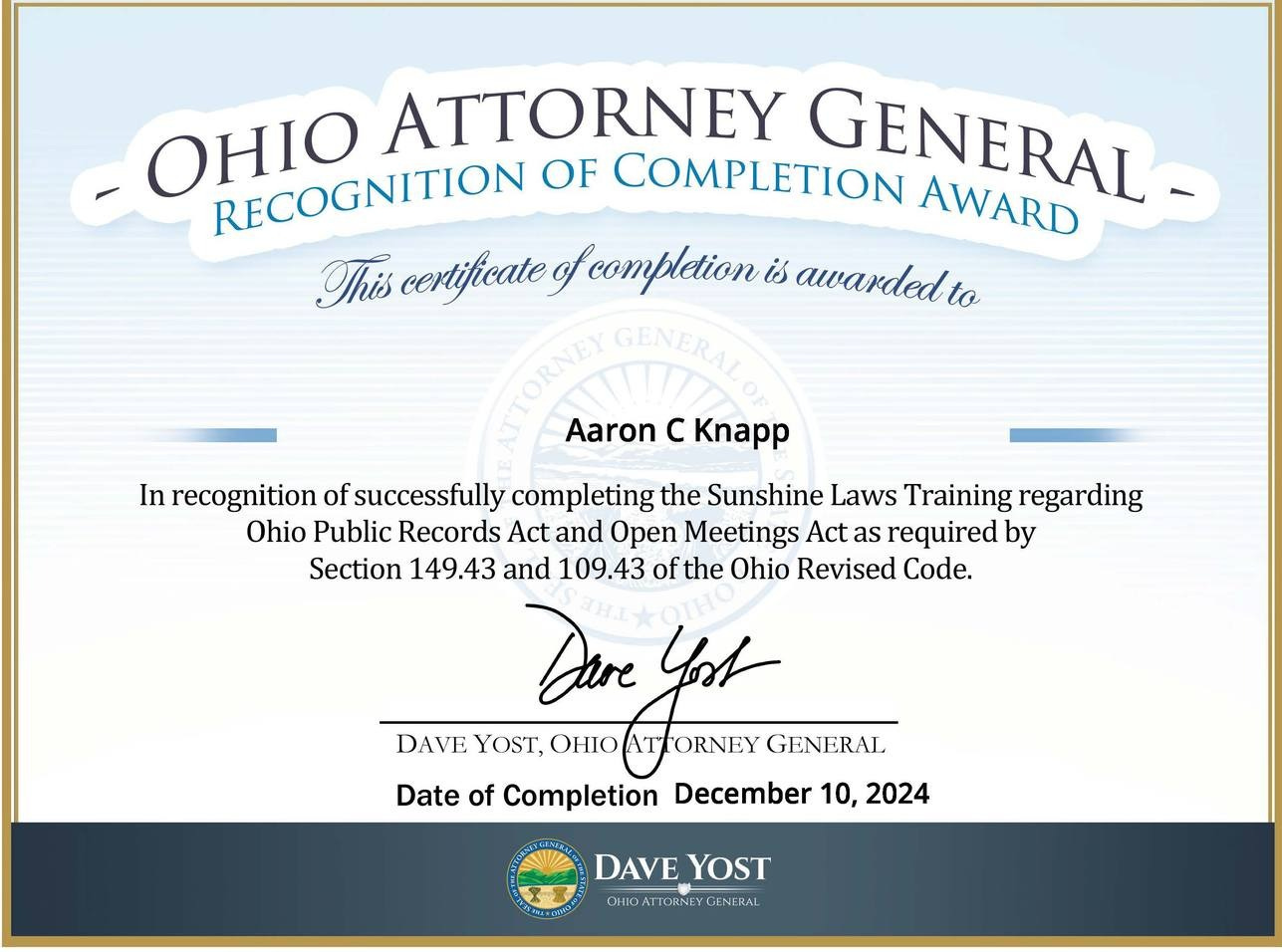
Click Here to Register for the Training Webinar
Click this link to Log in and create your own account and take the course online
Full 2025 Training Schedule Ohio Attorney General Sunshine Law Classes
Another great class (not required but helpful) that I took myself is here:
Mount Vernon Project School of Public Service
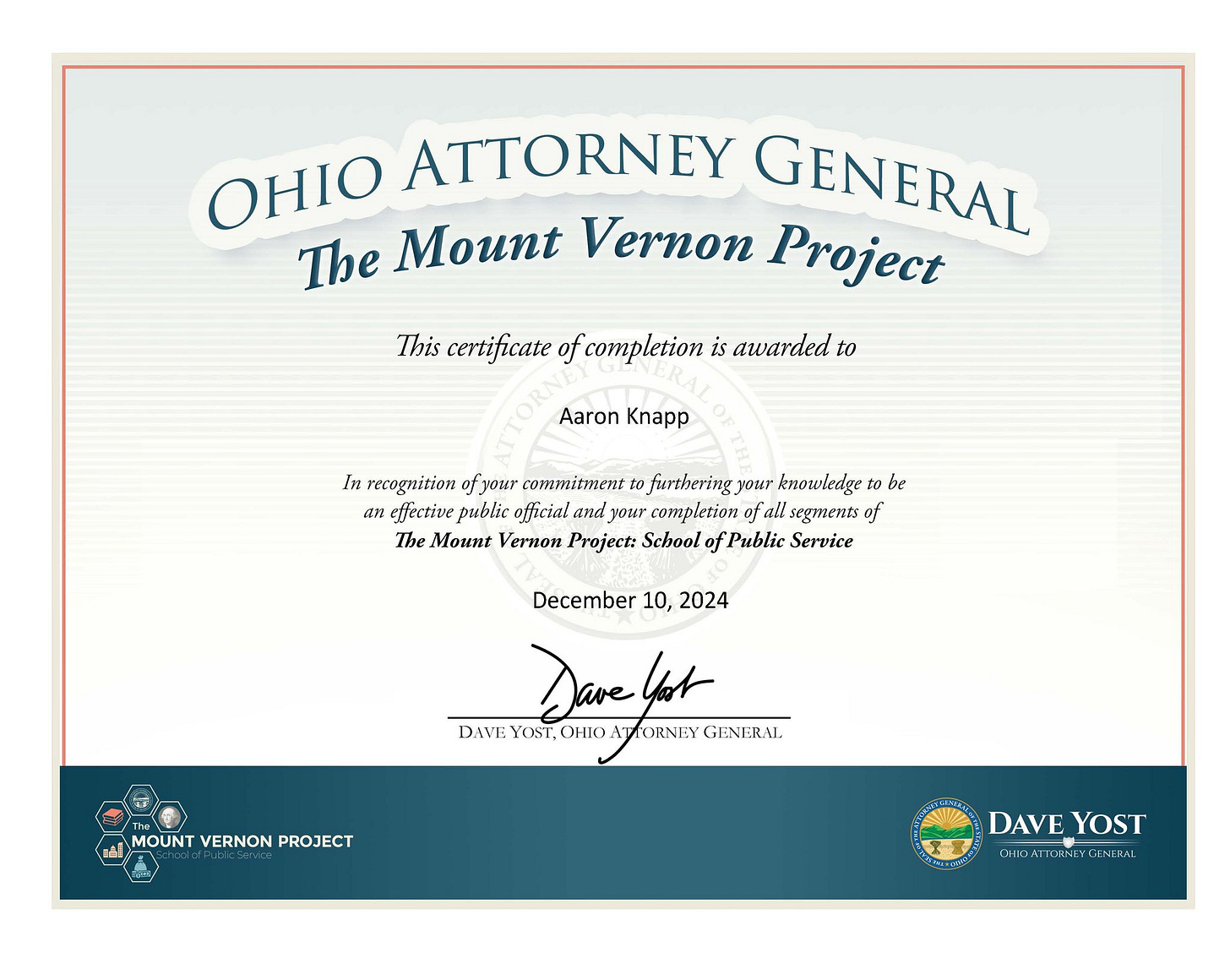
Yet in Lorain—and increasingly at the county level too—the unspoken policy appears to be: deny, deny, and wait until it dies. The hope is that if officials ignore the requestor long enough, or smother them in silence, the truth will simply go away. But it won’t. Not when the law is this clear, and not while I’m still watching.
The reality is that most residents don’t have the time, legal knowledge, or stamina to file dozens of follow-ups, parse bureaucratic spreadsheets, or sue their own city government. And public officials know that. The system isn’t just passively broken—it’s built to wear people down until they give up. That makes it even more important to speak out and demand a cultural shift inside City Hall—one where transparency is the default, not the exception.
Thanks for reading Aaron’s Substack! Subscribe for free to receive new posts and support my work.


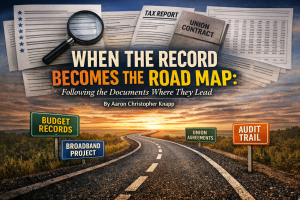
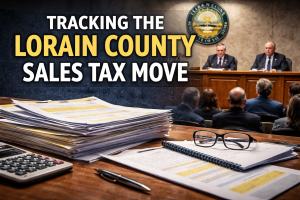
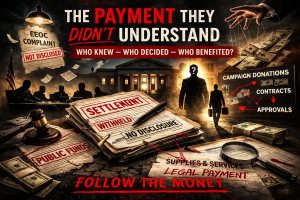
1 thought on “Rule 41, Broken: Why I Had to Sue Lorain City Council to Get Sunshine Law Compliance”